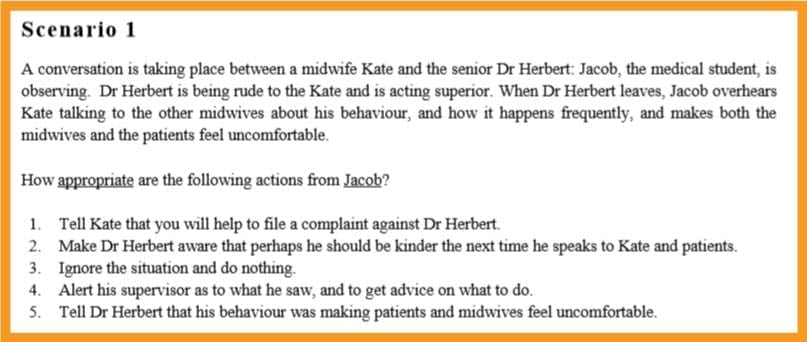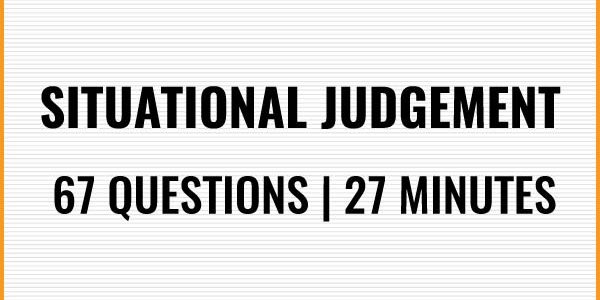UCAT Situational Judgement
67 questions | 27 minutes
UCAT situational judgement is section 5 of the exam.
This is a psychological aptitude test; it is an assessment method used to evaluate your ability in solving problems in work-related situations. UCAT Situational Judgement Tests (or SJTs) are widely used in medicine as one of the criteria when deciding on applicants.
The aim of the Situational Judgement section is to assess your ability to understand situations that you could encounter as a medical student or doctor and how you would deal with them. It is a method to test some of the qualities required in a healthcare professional (e.g. integrity and ability to work in a team).
Here is an example question; read it and see if you answer correctly at the end of this post!

Timing
The UCAT Situational Judgment test consists of 20 scenarios with 67 items. Each scenario will have 3-6 items. You will have 27 minutes to complete this section, which translates to approximately 24 seconds per item. Ensure you’re careful to mark your intended answers when working at this pace.
What are the questions like?
The SJT consists of a series of scenarios that include possible actions and considerations. Each scenario comprises two sets of questions. In set one you will be asked to assess the “appropriateness” of options in relation to the scenario. Our UCAT tuition will provide all the in-depth details you need for a successful application.
The first set is Appropriateness.
The four possible appropriateness choices are:
- A very appropriate thing to do– This is an ideal action.
- Appropriate, but not ideal – This option can be done but not necessarily the best thing to be done.
- Inappropriate, but not awful – This should not be done, but if it does occur the consequences are not terrible.
- A very inappropriate thing to do – This should not be done in any circumstances, as it will make the situation worse.
The second set is Importance.
The four possible importance options are:
- Very important – something that is essential to take into account.
- Important – something you should take into account but is not vital.
- Of minor importance – something that may be considered, but will not affect the outcome if it is not taken into account.
- Not important at all – something that is not relevant at all.
Watch this snippet from the UCAT Online Course in which Zenab talks through an “Appropriateness” question.
How you can get more marks in UCAT Situational Judgement
-
Read “Tomorrow’s Doctor”.
This is a publication produced by the GMC (General Medical Council) which can be found on their website. Reading through this will get you into a professional way of thinking that will help you judge these questions accurately.
-
Step into character.
When doing this section, imagine you’re there. Imagine yourself as a caring and conscientious medical student a few years from now, in each situation as it unfolds. What would you do? What do you think would be the right thing to do?
-
Think about hierarchy
All decisions that affect patient care should be made to benefit the patient. Of secondary importance are your work colleagues. Finally, of lowest importance (unfortunately) is yourself. Remember the key principles of professional conduct and you cannot go far wrong. Of utmost importance is patient safety.
-
Medical ethics
There tend to be a few ethical questions in each SJT paper so it is well worth your time to learn medical ethics. Whilst there are huge ethical textbooks available, you just need to be familiar with the basic principles for the UCAT. Think: Beneficence, Non-maleficence, Autonomy, Justice, Consent and Confidentiality.
Here’s the answer to the example question, how did you do?











